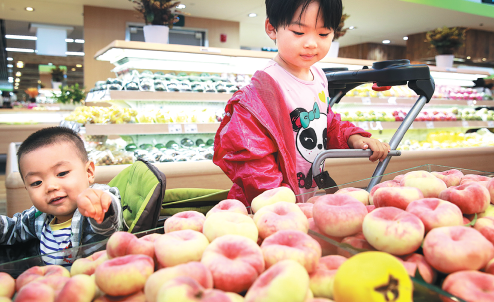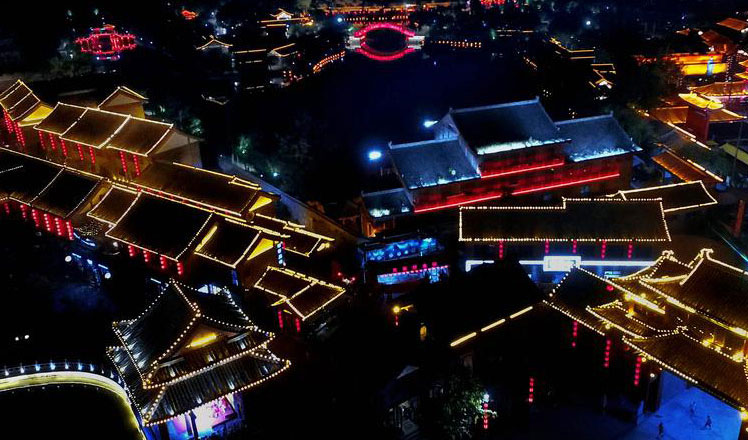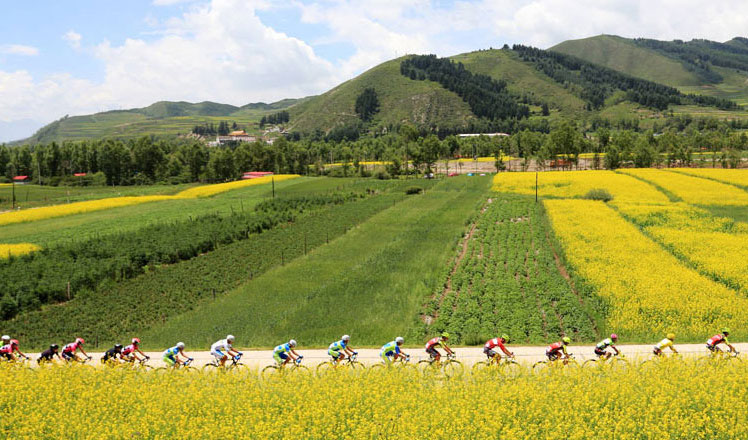Eat a peach
Updated: 2016-08-02 09:50
By Mike Peters(China Daily)
|
|||||||||
 |
|
Two kids at a peach stall in a Beijing supermarket.[Photo by Feng Yongbin/ China Daily] |
Summer's sweetest fruits are a sensation in meat dishes, desserts, cocktails or fresh from a market basket. Mike Peters opens wide for a big bite.
I think I was 8 years old the first time I was given serious responsibility.
My Grandpa Smotek gave me a wooden slingshot, a big hand-carved Y with a thick rubber band stretched across the top. We sat on camp stools at the edge of his huge garden, and I gingerly stretched the stout elastic this way and that.
He handed me a sack of dried peas and pointed to the double row of peach trees. The season's first fruits were starting to appear, about tennis-ball size, still too hard to eat but just beginning to turn rosy in color.
"Those peaches are almost ready to pick," he says. "We're not going to let the crows get them first."
And we didn't, though our pea-shooting didn't really make any feathers fly. We just made enough of a disturbance-twang!-to scare the critters away.
Childhood memories are often about summertime. And has summer really arrived before you bite into the first really ripe peach of the season? When the sweet aroma overwhelms your senses, and the abundant juice runs down both of your arms-well, you've just died and gone to heaven.
When I was growing up in the US state of Texas, I learned a lot about China in school and from the movies. I knew Chinese built the Great Wall-and invented paper, gunpowder, kung fu, dragons and other cool stuff.
Nobody ever told me the Chinese invented peaches. I just assumed my grandpa did.
But the Middle Kingdom is in fact where the succulent fruits of summer originated, one of many things that went out to the rest of the world via the Silk Road. (Did Marco Polo eat a peach?)
Peaches belong to the botanical genus prunus-they are oddly part of the rose family, though their closest cousins include plums, nectarines and almonds.
Learning that peaches were Chinese was one surprise; another one was the variety of peaches we have here. Some of the earliest to ripen are still a bit firm, colored like pink marble and to my nose oddly floral, but after that initial surprise they've become a favorite. Then there are those squatty donut-shaped peaches, which always seemed hard and too much trouble to eat at home, but are so delicious in markets here.
Like most fruits, peaches are a win-win when you eat them: healthy and delicious. Low in calories (100g contains just 39 calories) and free of saturated fats, peaches are moderate sources of anti-oxidant compounds as well as minerals (potassium, fluoride and iron) and vitamins (A, B-carotene and C).
"I have a longtime affection for peaches," says Scott Melvin, executive chef at The Commune Social in Shanghai, "as I always remember as a kid getting a peach was something of a novelty. It was very seasonal, so when peaches were available and came into season we always had them in our house.
"A peach recalls good memories of my childhood and my great-grandparents," he adds. "Also, I loved the story of James and the Giant Peach-I think it was one of first stories I really remember being read to me in primary school."
As a chef, Melvin says, he is always trying to use the best seasonal ingredients he can get his hands on: "When stone fruits come here in Shanghai, we always use them, in both savory and sweet dishes."
Here, Melvin offers two recipes from his current summer menu. Bon appetit!
Contact the writer at michaelpeters@chinadaily.com.cn
- From hunting wild fruits to satellite dishes: Life of Myanmar returnees
- World's first panda-themed subway line runs in Chengdu
- Minister: PLA to firmly protect maritime rights
- China raises alert level ahead of Typhoon Nida
- Japanese suspect detained in security inquiry
- Xi: Disaster relief must be improved
- Powerful blast rocks Afghan capital amid darkness
- Tokyo elects 1st female governor
- 450th Old Bridge diving competition held in Mostar
- S. Korea to launch WWII 'comfort women' victims foundation
- China to become Australia's biggest tourist source market
- Patient shoots, kills doctor in Berlin then kills himself

 Amazing night view of Kaifeng in Henan province
Amazing night view of Kaifeng in Henan province
 In pics: Women soldier carrying the flag
In pics: Women soldier carrying the flag
 Rough and tough world of soldiers' training
Rough and tough world of soldiers' training
 Moments from the 2016 Tour of Qinghai Lake
Moments from the 2016 Tour of Qinghai Lake
 Panda-themed subway line runs in Chengdu
Panda-themed subway line runs in Chengdu
 In pictures: Aerial images of Rio's Olympic venues
In pictures: Aerial images of Rio's Olympic venues
 Images reveal distinctive Tunpu culture in Guizhou
Images reveal distinctive Tunpu culture in Guizhou
 Ten photos from around China: July 22 – 28
Ten photos from around China: July 22 – 28
Most Viewed
Editor's Picks

|

|

|

|

|

|
Today's Top News
Ministry slams US-Korean THAAD deployment
Two police officers shot at protest in Dallas
Abe's blame game reveals his policies failing to get results
Ending wildlife trafficking must be policy priority in Asia
Effects of supply-side reform take time to be seen
Chinese State Councilor Yang Jiechi to meet Kerry
Chinese stocks surge on back of MSCI rumors
Liang avoids jail in shooting death
US Weekly

|

|









